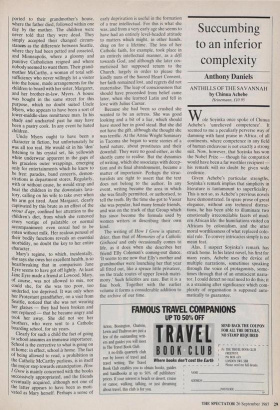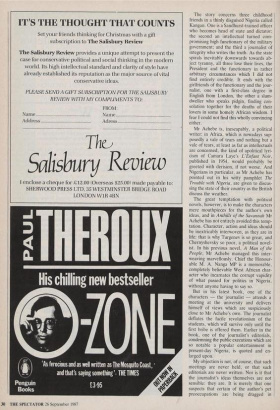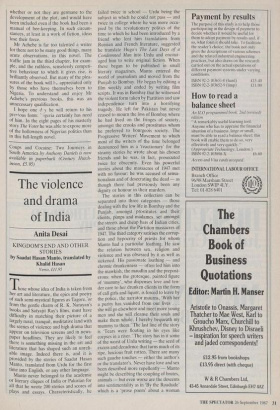Succumbing to an inferior complexity
Anthony Daniels
ANTHILLS OF THE SAVANNAH by Chinua Achebe
Heinemann, £10.95
Wole Soyinka once spoke of Chinua Achebe's 'unrelieved competence'. It seemed to me a peculiarly perverse way of damning with faint praise in Africa, of all continents, where competence in any field of human endeavour is not exactly a strong suit. Now, however, that Soyinka has won the Nobel Prize — though his compatriot would have been a far worthier recipient his remark will no doubt be given wide credence.
Given Achebe's particular strengths, Soyinka's remark implies that simplicity in literature is tantamount to superficiality. This is not so, as Achebe's previous novels have demonstrated. In spare prose of great elegance, without any technical distrac- tions, he has been able to illuminate two emotionally irreconcilable facets of mod- ern African life: the humiliations visited on Africans by colonialism, and the utter moral worthlessness of what replaced colo- nial rule. To convey intricacies simply is no mean feat.
Alas, I suspect Soyinka's remark has struck home. In his latest novel, his first for many years, Achebe uses the device of multiple narrations, sometimes speaking through the voice of protagonists, some- times through that of an omniscient narra- tor. I could detect no real need to do this; it is a straining after significance which com- plexity of organisation is supposed auto- matically to guarantee. The story concerns three childhood friends in a thinly disguised Nigeria called Kangan. One is a Sandhurst-trained officer who becomes head of state and dictator; the second an intellectual turned com- promising high functionary of the military government: and the third a journalist of integrity who writes the truth. As the state spirals inevitably downwards towards ab- ject tyranny, all three lose their lives, the President and the functionary in rather arbitrary circumstances which I did not find entirely credible. It ends with the girlfriends of the functionary and the jour- nalist, one with a first-class degree in English from London, the other a slum- dweller who speaks pidgin, finding con- solation together for the deaths of their lovers in some homely African wisdom. I fear I could not find this wholly convincing either.
Mr Achebe is, inescapably, a political writer: in Africa, which is nowadays sup- posedly a vale of tears and nothing but a vale of tears, at least as far as intellectuals are concerned, the kind of apolitical lyri- cism of Camara Laye's L'Enfant Noir, published in 1954, would probably be greeted with derision, if not worse. And Nigerians in particular, as Mr Achebe has pointed out in his witty pamphlet The Trouble with Nigeria, are given to discus- sing the state of their country as the British discuss the weather.
The great temptation with political novels, however, is to make the characters mere mouthpieces for the author's own ideas, and in Anthills of the Savannah Mr Achebe has not entirely avoided this temp- tation. Character, action and ideas should be inextricably interwoven, as they are in life: that is why Turgenev is so great, and Chernyshevsky so poor, a political novel- ist. In his previous novel, A Man of the People, Mr Achebe managed this inter- weaving marvellously. Chief the Honour- able M. A. Nanga MP is a memorable, completely believable West African char- acter who incarnates the corrupt vapidity of what passed for politics in Nigeria, without anyone having to say so.
But in his latest book, one of the characters — the journalist — attends a meeting at the university and delivers himself of views which are suspiciously close to Mr Achebe's own. The journalist deflates the facile revolutionism of the students, which will survive only until the first bribe is offered them. Earlier in the book, one of the journalist's editorials, condemning the public executions which are so notable a popular entertainment in present-day Nigeria, is quoted and en- larged upon.
My objection is not, of course, that such meetings are never held, or that such editorials are never written. Nor is it that the journalist's ideas themselves are not sensible: they are. It is merely that one suspects that certain of the author's pet preoccupations are being dragged in whether or not they are germane to the development of the plot, and would have been included even if the book had been a manual of bee-keeping. In such circum- stances, at least in a work of fiction, ideas lose their force.
Mr Achebe is far too talented a writer for there not to be many good things, many acute observations, in this novel. The traffic jam in the third chapter, for exam- ple, and the ruthless, senselessly competi- tive behaviour to which it gives rise, is brilliantly observed. But many of the plea- sures of the book will h., appreciated only by those who have themselves been to Nigeria. To understand and enjoy Mr Achebe's previous books, this was an unnecessary qualification. I hope one d y he will return to his previous form: ' igeria certainly has need of him. In the eight pages of his masterly story The Voter he was able to expose more of the hollowness of Nigerian politics than In this full-length novel.
Coups and Cocaine: Two Journeys in South America by Anthony Daniels is now available in paperback (Century Hutch- inson, £5.95)
































































 Previous page
Previous page